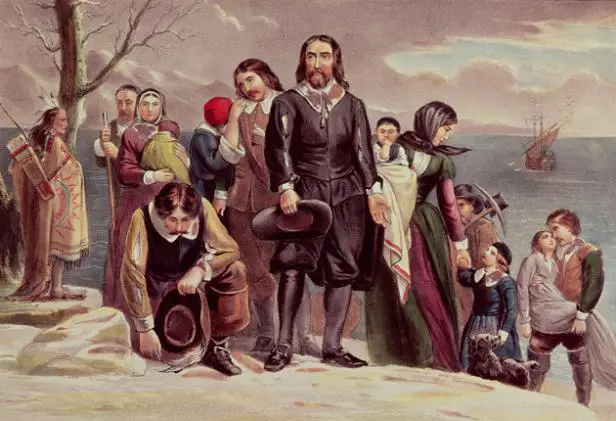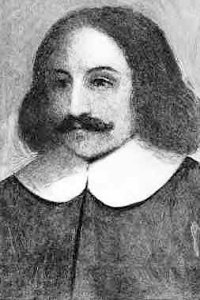William Bradford was the longest-serving and most well-known governor of the Plymouth Colony, one of Britain's earliest settlements in what is now the United States of America. A religious separatists like the other Pilgrims, Bradford served as Plymouth governor four different times, for a total of 30 years, and kept a record of the colony's goings-on that has been handed down as Of Plymouth Plantation. Bradford was born to relatively wealthy farmers in Austerfield, in Yorkshire, England, in 1590. When William was 4, his father died and his mother remarried. William, in turn, went to live with a grandfather, but that lasted just two years, until the grandfather died, and William returned to live with his mother. She died just a year later; and William, an orphan at 7, went to live with two of his uncles. William suffered a long illness and spent his recovery reading the Bible and literature.
The Puritans continued to meet at Scrooby Manor, but the secret got out and Brewster was arrested and fined. As a result, the Scrooby congregation left for Holland in 1607, the same year that the Jamestown settlement began in Virginia. The Scrooby group went to Amsterdam, and William Bradford joined them in 1608, living in Brewster's family household. The group relocated to a smaller city, Leiden. When Bradford turned 21, in 1611, he claimed his family inheritance and had enough money to buy a house and set up a weaving workshop. Two years later, he married Dorothy May in a civil service. Their first child, John, was born in 1617. That same year, the Scrooby group solidified plans for settling in the New World. It took a couple of years, but the group, now called the Pilgrims, made the journey, aboard the Speedwell and then the Mayflower, settling eventually in what is now Massachusetts. William and Dorothy Bradford were onboard but had left their 3-year-old son behind because he was too frail to make the long voyage. 
When the Mayflower landed, Bradford volunteered to go in one of the exploration parties, who eventually chose the site of the Plymouth Colony. While Bradford was away on an expedition, his wife, Dorothy, slipped overboard and drowned. The settlers began building the first house on Christmas Day in 1620. It was a hard winter, and Bradford suffered great illness. He survived when others did not and became a leader in the colony. John Carver, Plymouth Colony's first governor, signed a treaty with Massasoit, a friendly Native American, and Bradford recorded the terms of this treaty in his journal. When Carver died a year later, the members of the colony chose Bradford as their new governor. He was elected governor again three times in his lifetime. As governor, Bradford enjoyed considerable power in the colony. He was the chief judge and treasurer. He helped draft the colony's legal code. He made sure that the colony did not discriminate along religious lines, for non-Puritans soon joined the colony. Bradford married again, in 1623, to Alice Southworth. They had three children. After a long illness, Bradford died, in 1657. He is remembered as an inquisitive boy who grew up to be a strong leader who never forget his need to better himself and those around him. He taught himself the Greek language and read widely, including philosophy and classical poetry. He is also very well-known for Of Plymouth Plantation, a record of the developments in the Plymouth Colony from 1620 to 1647. He was one of the signers of the Mayflower Compact. |
|
Social Studies for Kids
copyright 2002–2026
David White



 A curious boy, William attended meetings at a Puritan church and met several new people, including William Brewster, who became a father figure to young William, lending him books and telling him of the church reforms taking place across the country. Brewster lived at Scrooby Manor, near Austerfield, and the manor became a secret meeting place for Puritans when King James I, who ascended to the throne in 1603, vowed to outlaw church reform.
A curious boy, William attended meetings at a Puritan church and met several new people, including William Brewster, who became a father figure to young William, lending him books and telling him of the church reforms taking place across the country. Brewster lived at Scrooby Manor, near Austerfield, and the manor became a secret meeting place for Puritans when King James I, who ascended to the throne in 1603, vowed to outlaw church reform.
